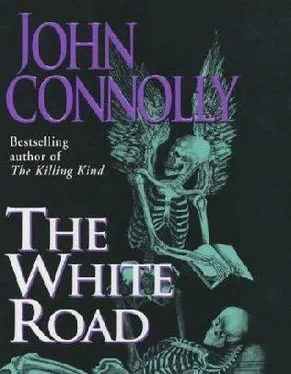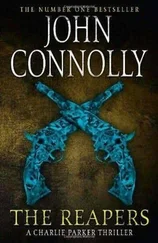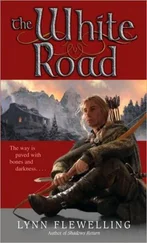“Or maybe we might pass through again, sometime,” he continued. “You still be here?”
“I hope so,” croaked Cebert.
“You think you’ll remember us?”
The question was spoken lightly, with what might have been the hint of a smile, but there was no mistaking its meaning.
Cebert swallowed. “Mister,” he said. “I’ve forgotten you already.”
With that, the black man nodded and he and his companion left, and Cebert didn’t release his breath until their car was gone from sight and the shadow of the sign cast itself, once again, on an empty lot.
And when the cops came asking about the men a day or two later, Cebert shook his head and told them that he didn’t know nothing about them, couldn’t recall if two guys like them had passed through that week. Hell, lot of people passed through here on the way to 301 or the interstate, kept the place going like a turnstile at Disney World. And anyway, all them black fellers look alike, you know how it is. He gave the cops free coffee and Twinkies and sent them on their way and had to remind himself, for the second time that week, to release his breath.
He looked around at the business cards arrayed on every previously blank stretch of wall, then leaned over and blew some dust from the nearest bunch. The name Edward Boatner was revealed. According to his card, Edward sold machine parts for a company out of Hattiesburg, Mississippi. Well, if Edward came through here again, he could take a look at his card. It would still be there, because Edward wanted to be remembered.
But Cebert didn’t remember nobody that didn’t want to be remembered.
He might have been friendly, but he wasn’t dumb.
A black oak stands on a slope at the northern edge of a green field, its branches like bones set against the moonlit sky. It is an old, old tree; its bark is thick and gray, deeply furrowed with regular vertical ridges, a fossilized relic stranded by a long-departed tide. In places, the orange inner bark has been exposed, exuding a bitter, unpleasant scent. The shiny green leaves are thick upon it: ugly leaves, deep and narrow, with bristle-tipped teeth at the ends of the lobes.
But this is not the true smell of the black oak that stands at the edge of Ada ’s Field. On warm nights when the world is quieted, hand-on-mouth, and the moonlight shines palely on the scorched earth beneath its crown, the black oak discharges a different odor, alien to its kind yet as much a part of this solitary tree as the leaves on its branches and the roots in its soil. It is the smell of gasoline and burning flesh, of human waste and singeing hair, of rubber melting and cotton igniting. It is the smell of painful death, of fear and despair, of final moments lived in the laughter and jeering of onlookers.
Step closer, and the lower parts of its branches are blackened and charred. Look, see there, on the trunk: a cloven groove deep in the wood, now faded but once bright, where the bark was suddenly, violently breached. The man who made that mark, the final mark he left upon this world, was born Will Embree, and he had a wife and a child and a job in a grocery store that paid him a dollar an hour. His wife was Lila Embree, or Lila Richardson that was, and her husband’s body-after the ending of the final, desperate struggle that caused his booted foot to strike so hard against the trunk of the tree that he tore the bark from it and left a pit deep in its flesh-was never returned to her. Instead his remains were burned and the crowd took souvenirs of the blackened bones from his fingers and toes. Someone then sent her a photograph of her dead husband that Jack Morton of Nashville had printed up in batches of five hundred to be used as postcards, Will Embree’s features twisted and swollen, the figure standing at his feet grinning as the flames from the torch leap toward the legs of the man Lila loved. His corpse was dumped in a swamp and the fish stripped the last of the charred flesh from his bones until they came apart and were scattered across the mud on the bottom. The bark never reclaimed the breach made by Will Embree and it remained exposed for ever after. The illiterate man had left his mark on the sole monument to his passing as surely as if it had been carved in stone.
There are places on this old tree where no leaves ever grow. Butterflies do not rest upon it, and birds do not nest in its branches. When its acorns fall to the ground, fringed with brown hairy scales, they are left to decay. Even the crows turn their black eyes from the rotting fruit.
Around the trunk, a vine weaves. Its leaves are broad, and from each node springs a cluster of small green flowers. The flowers smell as if they are decomposing, festering, and in daylight they are black with flies drawn by the stench. This is Smilax herbacea, the carrion flower. There is not another one like it for a hundred miles in any direction. Like the black oak itself, it is alone of its kind. Here, in Ada ’s Field, the two entities coexist, parasite and saprophyte: the one fueled by the lifeblood of the tree, the other drawing its existence from the lost and the dead.
And the song the wind sings in its branches is one of misery and regret, of pain and passing. It calls over untilled fields and one-room shacks, across acres of corn and mists of cotton. It calls to the living and the dead, and old ghosts linger in its shade.
Now there are lights on the horizon and cars on the road. It is July 17, 1964, and they are coming.
They are coming to see the burning man.
Virgil Gossard stepped into the parking lot beside Little Tom’s Tavern and belched loudly. A cloudless night sky stretched above him, dominated by a yellow killer moon. To the northwest, the tail of the constellation Draco was visible, Ursa Minor below it, Hercules above, but Virgil was not a man to take time to look at the stars, not when he might miss a nickel on the ground in the process, and so the shapes that the stars had taken were lost on him. From the trees and the bushes the last of the field crickets sounded, undisturbed by traffic or people, for this was a quiet stretch of road, with few houses and fewer folk, most having abandoned their homes for more promising surroundings many years before. The cicadas were already gone and soon the woods would prepare for the winter quiet. Virgil would be glad when it came. He didn’t like bugs. Earlier that day, a piece of what looked like greenish lint had moved across his hand while he lay in bed and he had felt the brief sting as the masked hunter, scouring Virgil’s filthy sheets for bedbugs, bit into him. The thing was dead a second later, but the bite was still itching. That was how Virgil was able to tell the cops what time it was when the men came. He had seen the green numerals on his watch glowing as he scratched at the bug bite: 9:15 P.M.
There were only four cars in the lot, four cars for four men. The others were still in the bar, watching a rerun of a classic hockey game on Little Tom’s crappy TV, but Virgil Gossard had never been much for hockey. His eyesight wasn’t so good and the puck moved too fast for him to follow it. But then everything moved too fast for Virgil Gossard to follow. That was just the way of things. Virgil wasn’t too smart, though at least he knew it, which maybe made him smarter than he thought. There were plenty of other fellas thought they were Alfred Einstein or Bob Gates, but not Virgil. Virgil knew he was dumb, so he kept his mouth shut and his eyes open, best he could, and just tried to get by.
He felt an ache at his bladder and sighed. He knew he should have gone before he left the bar but Little Tom’s bathroom smelled worse than Little Tom himself, and that was saying something, seeing as how Little Tom smelled like he was dying from the inside out, and dying hard. Hell, everybody was dying, inside out, outside in, but most folks took a bath once in a while to keep the flies off. Not Little Tom Rudge, though: if Little Tom tried to take a bath, the water would leave the tub in protest.
Читать дальше












